Gabeba Baderoon
The pen
After her father’s death, a poet considers her relationship with loss.
We’re pleased to offer Gabeba Baderoon’s poem, and invite you to connect with Poetry Unbound throughout this season.
Pre-order the forthcoming book Poetry Unbound: 50 Poems to Open Your World and join us in our new conversational space on Substack.
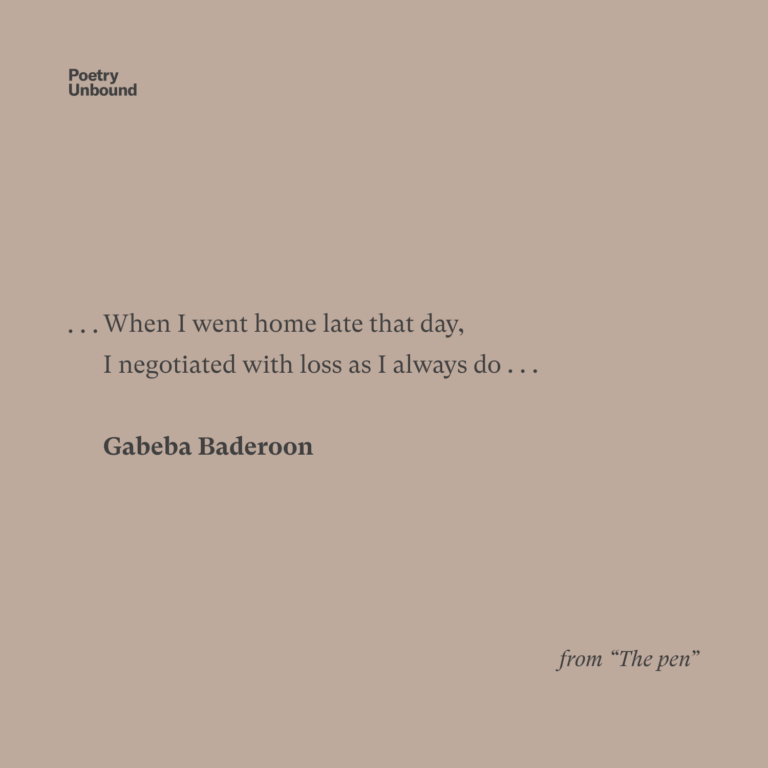
© All Rights Reserved.
Guest
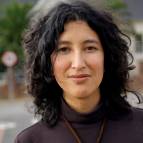
Gabeba Baderoon is an Associate Professor of Women’s Studies, Gender and Sexuality Studies, and African Studies at Penn State University and is the co-founder of the African Feminist Initiative at the university. She is the author of several collections of poetry, including The Dream in the Next Body (Kwela Books 2005), A hundred silences (Kwela Books 2006), and most recently, The History of Intimacy (Kwela Books 2018).
Transcript
Pádraig Ó Tuama: Friends, thanks very much for listening to Poetry Unbound, whether you’re new or you’ve listened to them all — your attention makes everything worthwhile. And I’ve got some news: I’ve written a book, Poetry Unbound: 50 Poems to Open Your World. There’s 50 poems, each with a fresh essay written by me. I’d love if you pre-order it, or pre-order a few, and join up to our free interactive newsletter. Links to everything at poetryunbound.org.
[music: “Praise the Rain” by Gautam Srikishan]
My name is Pádraig Ó Tuama, and I spent a lot of time thinking about reconciliation and conflict resolution. And there can be a fantasy about what a resolved estrangement or a resolved conflict will look like: that you’ll talk through everything and everybody will understand each other. But that’s not always the way it happens. Sometimes time passes and somehow people realize that we have no words to describe what happened before, but nonetheless, we turn toward each other. Somebody turns up, or they bump into each other at a party, or there’s some distraction where they’re able to find a way towards each other without having to say, “we’ve arrived at consensus,” or we even have language for what happened between us. Sometimes I’ve been the fault of the conflict, or somebody else had, or we don’t know, something just happened, some strangeness between us. But still, somehow, reconciliation can occur like an event between you, like some kind of mystery.
[music: “Praise the Rain” by Gautam Srikishan]
“The pen” by Gabeba Baderoon
“Three days before my father died
I lost the silver pen with my name on it,
a twenty-first birthday gift from my aunt
I’d kept for almost ten years.
“That day, supervising students in Khayelitsha
putting up a netball hoop, I came home
to ask to borrow his tools.
We walked around the garage and I ticked
off the ladder, drill, nails and screwdriver on my list,
and he suggested, I add a hammer and level.
Somewhere between stacking and loading
the car, I lost my pen without even noticing
it had slipped from my hand.
“When I went home late that day,
I negotiated with loss as I always do,
not going back to the garage to look for the pen
in case it wasn’t there,
to keep its absence incomplete
so it could come back one day.
“In three days,
the impossible sequences of death.
“I went back
over everything we’d said that day
and the years when we didn’t speak
and the reconciliation, almost wordless,
when we walked towards each other with our eyes down
and wept while we hugged.
“The night he died
I felt the completeness of loss,
of absence without negotiation,
“and yet what was still there,
that moving towards each other,
without looking.”
[music: “Akonan” by Blue Dot Sessions]
This poem is set in Khayelitsha, which is a township on the Western Cape of South Africa, about 15 or 16 miles outside Cape Town. Gabeba Baderoon is a South African poet who also teaches part of the year in the United States.
This is a beautiful narrative poem that’s titled when actually what unfolds in the story is the death of a father. The poet in the poem goes to borrow tools from her father so she can fix the netball hoop at work, loses the pen somewhere in the dad’s garage. And then what’s so interesting is that the pen is the first loss that’s navigated. We hear that she has a particular way of dealing with loss. “I negotiated with loss as I always do.” And I love the psychological insight here that she doesn’t want to find out that it’s not there. She knows she doesn’t have it, but she doesn’t want to go back to the garage. Because if it’s not there, well, then it could be lost forever perhaps. Quietly underneath that there’s the recognition that had she gone back to see if the pen was there on the floor of her dad’s garage she’d have seen him again before he died, because he died three days later and she goes back over this last conversation. But I love that she doesn’t use that habit that she has of not wanting to go back and find the pen, I love that she doesn’t use that as a way of berating herself. This isn’t a poem of regret. This is a poem where she is able to remember the last conversation, remember years of estrangement and that beautiful, elegant way of describing their reconciliation: almost wordless walking towards each other with her eyes down and weeping while they hugged. There is a sense that even though he is gone and she won’t find him again, nonetheless, there is something still there.
[music: “Sage the Hunter” by Blue Dot Sessions]
This is a poem about losses and negotiating with them and navigating your own losses. You know, the loss of the pen and the holding out a possibility of finding the pen. But also then the estrangement with the father. They were lost to each other and somehow, strangely, they found their way to each other.
“…the reconciliation, almost wordless,
when we walked towards each other with our eyes down
and wept while we hugged.”
What does that mean for her? Memory? Recollection? The reflection on the fact that they did manage to have that reconciliation, that the estrangement between them somehow was able to be softened, and that it wasn’t only words that did it. It was “almost wordless.”
That doesn’t seem like it was an intervention done by a mediator or a family member. It sounds like something was ready to be found, and therefore, because it was ready to be found, they could find each other in a reconciliation.
The pen holds a lot of power in the poem, but crucially isn’t the final image. The pen is there, not there. Lost, but perhaps not lost completely. She might have found it after she wrote this poem. But the loss of the pen is like a, a gateway into describing the relationship with loss. And what we see here is that the fact that she has clearly spent a lot of time thinking about her relationship with loss means that when she has lost somebody finally, in a way that can’t be reconciled, that loss isn’t one of emptiness, that loss is filled with memory.
[music: “Memoriam” by Gautam Srikishan]
I find myself thinking about in this poem, whether it’s a poem that says you need to be reconciled when there’s been an estrangement. And I don’t think this poem is saying that that has to be the way that things happen. It’s just saying that this is what did happen in this particular relationship of estrangement and reconciliation.
Something elemental was reestablished between the two of them, and it was reestablished through their bodies while they hugged. But their eyes were down. What is happening in the reconciliation is somehow not center stage. It’s absolutely vital, absolutely elemental. It’s almost fundamental. It’s deep into the essence of the earth, the way that the two of these come back together again. And therefore I see this poem as proclaiming how glad she is that this could have happened. And that after that, an everyday ordinariness of coming around to borrow his tools, reoccurs back into the relationship and there’s an ease back and forth, there’s a lack of intensity. They’re reconciled back into ease rather than back into overly intense conversations, analyzing everything that happened.
I love the integrity of the reconciliation, the way that they didn’t speak for a few years and that the reconciliation also happened without language. Somehow, this is speaking about communication that can happen on a level deeper than a language, maybe even on a level deeper than what you can write about.
[music: “Family Tree” by Gautam Srikishan]
“The pen” by Gabeba Baderoon
“Three days before my father died
I lost the silver pen with my name on it,
a twenty-first birthday gift from my aunt
I’d kept for almost 10 years.
“That day, supervising students in Khayelitsha
putting up a netball hoop, I came home
to ask to borrow his tools.
We walked around the garage and I ticked
off the ladder, drill, nails and screwdriver on my list,
and he suggested I add a hammer and level.
Somewhere between stacking and loading
the car, I lost my pen without even noticing
it had slipped from my hand.
“When I went home late that day,
I negotiated with loss as I always do,
not going back to the garage to look for the pen
in case it wasn’t there,
to keep its absence incomplete
so it could come back one day.
“In three days
the impossible sequences of death.
“I went back over everything we’d said that day
and the years when we didn’t speak
and the reconciliation, almost wordless,
when we walked towards each other with our eyes down
and wept while we hugged.
“The night he died
I felt the completeness of loss
of absence without negotiation,
“and yet what was still there,
that moving towards each other
without looking.”
[music: “Praise the Rain” by Gautam Srikishan]
Chris Heagle: “The pen” comes from Gabeba Baderoon’s book The History of Intimacy. Thank you to Kwela Books, who gave us permission to use Gabeba’s poem. Read it on our website at onbeing.org.
[music: “Praise the Rain” by Gautam Srikishan]
Poetry Unbound is: Gautam Srikishan, Eddie Gonzalez, Lilian Vo, Lucas Johnson, Amy Chatelaine, Kayla Edwards, and me, Chris Heagle.
Our music is composed and provided by Gautam Srikishan and Blue Dot Sessions.
This podcast is produced by On Being Studios, which is located on Dakota land. Open your world to poetry with us by subscribing to our Substack newsletter at poetryunbound.org. You may also enjoy our other podcast On Being with Krista Tippett, or our newsletter, The Pause. Visit us at onbeing.org to find out more.
Books & Music
Recommended Reading
The On Being Project is an affiliate partner of Bookshop.org and Amazon.com. Any earnings we receive through these affiliate partnerships go into directly supporting The On Being Project.






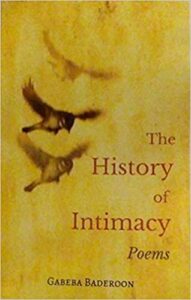
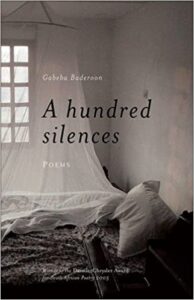
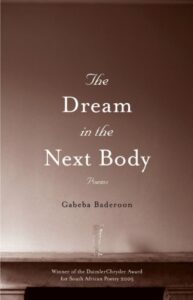

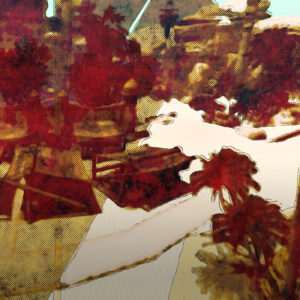
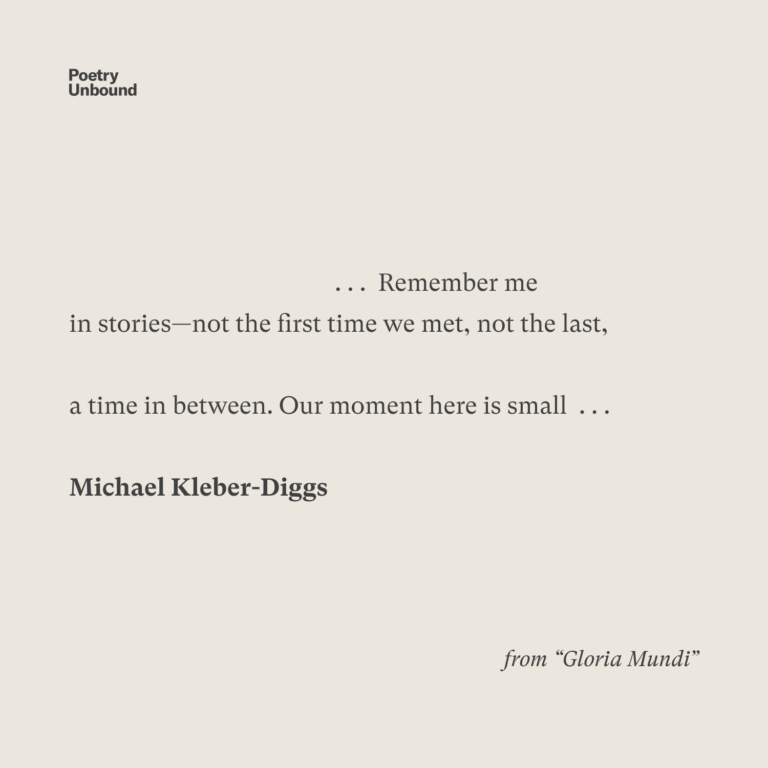
Reflections